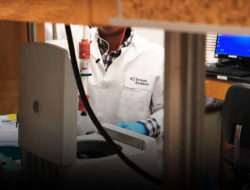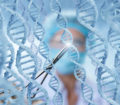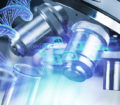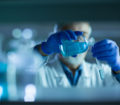While politicians, consumers, and the plastic industry tussle over bans on single-use plastics like cutlery, straws, and bags, the stuff is still piling up. Thankfully, clever San Diegans are devising solutions to the global plastic problem.
Toss This Cutlery in the Garden—Not the Trash
Unlike straws, plastic cutlery is hard to replace with biodegradable materials. You can’t spear a chunk of steak or slurp soup with paper. But you can do it with flour, water, and a bit of ingenuity.
Hot on the heels of single-use plastic cutlery bans in cities like Malibu and Seattle, local bioengineer and UC San Diego graduate Zhicong “Zack” Kong is launching his own compostable, flour-based brand, TwentyFifty Fork, named for the year that scientists predict the oceans will contain more plastic than fish. The product biodegrades in just about three weeks, and it can be made from different kinds of flour depending on the market—wheat, soy, and corn in the US, rice and tapioca in Southeast Asia, and algae in Indonesia.
He’s also devised a proprietary molding process that’s cheaper to operate than traditional methods, churning out several thousand forks and spoons daily at a facility in Oceanside. And if his Kickstarter campaign goes well, he’ll be able to ramp that up to 180,000 pieces a day.
“People have tried to do this before, but haven’t designed a manufacturing process that can compete with the one-to-two-cent cost of plastic cutlery,” says Albert Lui, who’s working to develop Kong’s innovations into a viable business.
Kong wants to take the sustainability of his process even further by recycling any wasted dough into a source for growing “alternative proteins.” He won’t say which kind exactly, but suggested it might be insects.
Feed Your Plastic to a Living Recycler
Two years ago, Japanese researchers found something amazing outside a recycling plant: bacteria that eats PET, the plastic used in soda bottles and countless other products. Scientists had been looking for biological solutions to the plastic problem for years, but even this bacterial digestion is a painfully slow process, so an international team began researching slight changes they could make to the key enzyme responsible that would supercharge its metabolism. Doing so required massive computing power—which is why they turned to Comet, one of UCSD’s famed supercomputers, capable of making 2.76 quadrillion calculations per second.
“Nature hasn’t necessarily evolved the perfect enzyme for this activity, and we want to engineer an even better one,” says Gregg Beckham, of the National Renewable Energy Laboratory in Golden, Colorado.
Without ever setting foot in San Diego, Beckham and scientists from Florida, Brazil, and the United Kingdom fed Comet a workload that would have taken a desktop computer months to complete. Comet blazed through it in mere weeks. “It allowed us to understand at the molecular level how the enzyme binds and sticks to plastic,” Beckham says.
They found that small genetic changes would spur the bacteria to produce a more powerful, mutant enzyme capable of devouring plastic like an NFL team at a buffet.
Nature hasn’t necessarily evolved the perfect enzyme for this activity, and we want to engineer an even better one.
It’s still a computer model, but now researchers know it’s possible.
New approaches are critical, since present-day plastic recycling methods aren’t cost effective, and recycled plastic often returns at a lower quality—bottles can be turned into carpet, for example, but not the reverse.
The long-term objective is to engineer a more potent enzyme that’s able to break down plastic into something more useful. “If we can incentivize upcycling and reclamation of plastics, that’s our goal,” Beckham says.
Tags: Ideas, Innovation, Plastic, Startups, UCSD






























